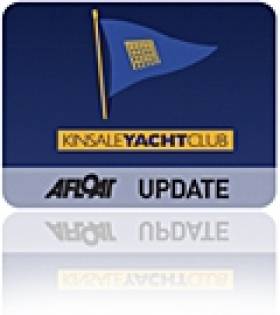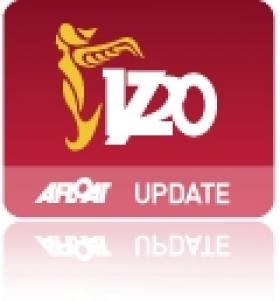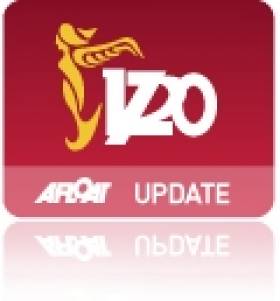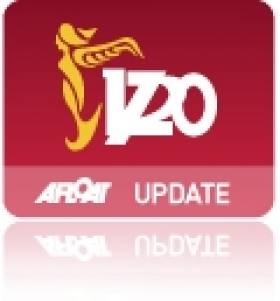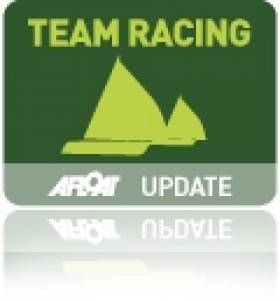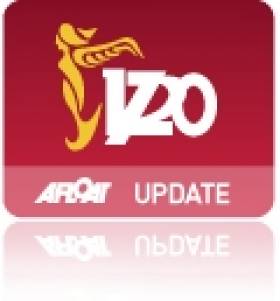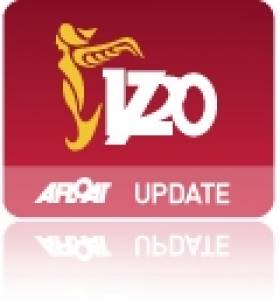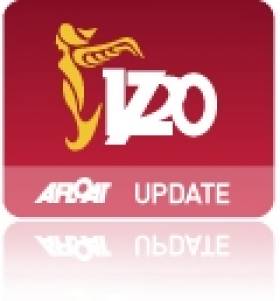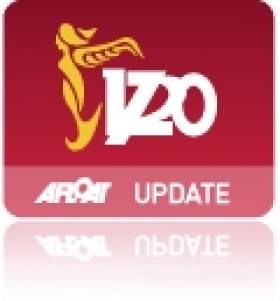Displaying items by tag: 1720
With 11 boats already entered it is anticipated there will be in excess of 20 boats taking part in the 1720 European Championships, as part of the Covestone Asset Management Sovereign's Cup Regatta.
Current entries include Class Captain Finbarr Jeffers, Anthony and Peter O'Leary, class new-comer Wietse Buwalda, along with a host of class regulars from both at home and the UK.
Class Captain Jeffers expressed his delight at the uptake thus far, expressing the view that 20 boats is definitely a realistic target for this resurgent class.
The 1720 class will race on their own windward leeward and Olympic style courses as part of Sovereign's Cup. Regatta Director Mike Walsh is delighted with the classes decision to hold their European's as part of Sovereign's Cup and looks forward to offering the class good racing on the water and involving himself in the classes legendary ability to enjoy themselves ashore!
Mansfield Retains 1720 Euro Crown in West Cork
#1720 - In a star studded cast in Baltimore, West Cork the 1720 European Championships finished on Saturday with National Champions Mark Mansfield and Terry English retaining their Euro title but only in the last race of the championship.
The result means Mansfield/English have won the last two Europeans and last two Nationals since they bought their current boat at the start of 2011.
The class is experiencing a resurgence of interest with inexpensive boats, one design racing and a good social aspect to the events (including finishing regattas on Saturdays to ensure a good final prizegiving night) credited as key points in the rebirth of the class over the last three years.
The Euro event was sponsored by Corona beer and sailed from Thursday to Saturday. 1720s came from Ireland, England, Scotland and Wales to compete with an 18 boat fleet sailing under race officer David O'Brien.
Two races were sailed on last Thursday's first day of racing in 7 to 8 knots and both were won by London Olympian Peter O'Leary who took a four point lead into day 2 over Mansfield/English.
Day two was sailed in 12/13 knots and a 1, 1, 3 in the three races put Peter's brother Nicholas O' Leary (a triple winner of the All Ireland sailing championships) into a one point lead over Peter with Mansfield/English a further 3 points back.
The final day was sailed in perfect sunny 18/20 knot conditions with 3 races. Mansfield/English took a 1st and a 3rd in the first two races to close the gap on the two O'Leary boats going into the last race.
In the end Mansfield emerged two points clear with Nicholas (who had Sydney Olympian Maria Coleman as a crew member) had to be content with second overall. Third place went to Olympic Star rep, Peter in Wet 'n'Ready.
Full results downloadable below as a jpeg file.
The Irish 1720 class has added a further two boats to its fleet number this season. The next port of call for the class is Royal Cork's CH Marine sponsored October league.
Mansfield Retains 1720 Sportsboat Title
#1720 – With no wind expected for Cork Harbour today Mark Mansfield retained his 1720 national title after two days of competition in Cork Harbour. See our earlier reports from 1720 Day one and 1720 Day two for results and action photos from Bob Bateman.
English and Mansfield Move into the 1720 Lead
#1720 – After two days of racing at the CH Marine 1720 National Championships and six races sailed the leader on 10 pts is Terry English and Mark Mansfield's Gut Rot crewed by Mike Budd, Bernard Fitzpatrick and Joe Bruen writes Claire Bateman.
Lying second is Anthony O'Leary's Wet n' Black crewed by Dan O'Grady, Derick Moynan, Eoin Leahy and David Whitaker. The Holyhead SC Ricochet of Steve, George and Tom Forester-Cole with Hannah Peters, Kelvin Matthews and Mark Lees in third place being very competitive and taking wins in two of the six races despite sailing in unfamiliar waters.
On a day when the weather was suited for sun hats and sun cream the wind much more benign with a steady southerly breeze 7 to 8 kts occasionally going to 10 to 11 kts PRO John Moynihan was able to set windward leeward courses a mile east of Roche's Point and got in four excellent races on the day.
At the conclusion of Race Six today the Racce Officer had an unenviable task when six of the flying 1720s bore down on the finish line, within seconds of one another in a tightly knit bunch more like the start than a finish of a race. Some spectacle to watch.
#1720 –A single point separates first and fourth place overall after two high speed races of the CH Marine sponsored 1720 National Championships writes Claire Bateman.
Defending champion Mark Mansfield, who is always formidable in strong winds, lies fourth overall after counting a 2 and a 4 in the 15-boat fleet while Finbarr Jeffers leads from Anthony O'Leary on an equal five points. Scroll down the page for more photos and results.
It was well worth waiting for the winds to abate in Cork harbour yesterday because by 5pm the first race of the championships got off to a cracking start in blustery high winds
Racing over windward leeeward course on the Eastern Bank off Aghada and with the weathermark close to the Spit the fleet enjoyed two great races and provided plenty of thrills and spills with even the heavy weather experts, Anthony O'Leary and defending champion Mark Mansfield both experiencing broaches inspite of the use of smaller jibs and kites. Photos of the action below.
| Series Place | Sail No | Boat | Owner | Series Points |
|---|---|---|---|---|
| 1 | IRL1750 | Wahoo | Finbarr Jeffers | 5 |
| 2 | IRL1843 | Wet n' Black | Anthony O'Leary | 5 |
| 3 | GBR1722 | Ricochet | Steve Forester-Coles | 6 |
| 4 | GBR1726 | Gut Rot | Terence English & Mark Mansfield | 6 |
| 5 | IRL1790 | T-Bone II | Tom Durcan & Clive O'Shea | 8 |
| 6 | IRL1804 | Aquatack | Denis Murphy | 13 |
| 7 | IRL1807 | Red Penguin | Robert O'Leary | 14 |
| 8 | IRL1785 | Primeline | John Crotty | 15 |
| 9 | GBR1771L | Cosmic | David Townend | 20 |
| 10 | IRL180 | Bad Company | F Desmond/M Ivers/P Horgan | 21 |
| 11 | IRL1797 | Dark Side | Bryan Hassett | 21 |
| 12 | IRL1722 | Smile N Wave | Jim Griffiths / Ben Cooke | 22 |
| 13 | IRL1724 | Boomerang | Tom Hegarty/Bob Stokes | 26 |
| 14 | IRL1760 | Let the Good Times Roll | Robin & Ben O'Mahony | 28 |
| 15 | IRL1755 | Live Wire | James & Mick McKenna | 30 |
'2k' Format Will be New Lease of Life for Team Racing
Irish team racers, and those whose college sailing days are behind them, can look forward to rediscovering the joys of a new kind of team racing writes our Correspondent, Magheramore.
The Dutch have discovered team racing. They have become very keen on two boat team racing in keel-boats with 30 teams competing in their National Championships. Realising the potential for this version of the sport a major international event is planned in September this year, and there is a bid to run an official World Championships in 2013.
An international circuit is now emerging for this discipline – now known as 2k. Events are planned on the Clyde, in Italy, Poland, England and the Netherlands. The potential is considerable. In many countries sailing centres have fleets of small one design keel-boats already used for match racing. 2K racing increases the number of days these fleets are in competitive use. There is also a well established circuit in the USA, where the Sonar is commonly used. There are even events organised especially for the more mature sailor.
This should be good news for Irish sailors. We have a long tradition of team racing, with predominately university teams competing in Firefly dinghies. In Munster, the group based around Schull Community College has provided a base for schools team racing, and the whole town did a magnificent job of hosting the Worlds last year. In addition, the Royal Alfred Yacht Club has maintained a tradition of team racing in keelboats with the Patriots Cup, not to forget the Glen class in Dun Laoghaire who compete in the Millennium Cup, a 4 boat per team event. Many graduate sailors have moved on to match racing, using the Sailfleet J80s, with some success.
The development of 2k racing is an opportunity for clubs. Team-racing, in all its forms, creates a dynamic within the club, as teams train and compete and socialise. Graduates, who seem to find the Firefly gets smaller every year, can relive the exploits of their college days without breaking the bank. As events can be graded, adult trainees can experience the joys of competitive sailing at level suited to their ability. Sailing club boats will increasing look an attractive proposition to the negative-equity generation
The initial outlay to procure a fleet of boats may seem a considerable obstacle. However, if the right boat is chosen they can have a long and useful life. There is, for instance, in Brittany, a fleet of Beneteau Class 8s that have been raced hard for 20 years and are still in use for top class competition. The Dun Laoghaire 1720s also demonstrate that there is no need to buy new boats.
The cost of a day's sailing, including maintenance and depreciation, reduces rapidly the more boats are used. If a fleet can be used for match racing, 2k racing and adult training then the number of days sailed should sufficient to cover these costs.
With moves afoot to further develop junior and schools team racing this most social version of the sport is a true "Sport for Life" with the added advantage for sailors (and their parents!) of being able to compete at the highest level without the strain of owning a boat. It is now possible to envisage a career in sailing progressing from beginners sailing courses through junior team racing in Picos, then Fireflies or similar, with the prospect of travel to the UK, the USA or the Eurosaf Championships on the lagoon in Venice. After college racing and a foray in to the UK circuit (and further afield) a move to keel-boats would allow sailors to continue to race almost indefinitely.
All in all, the Dutch initiative to develop team racing in keelboats is to be welcomed. Irish team racers, and especially those whose college days are behind them, can look forward to rediscovering the joys of the squeeze, the mark trap and the sweet sound of the umpire's whistle! Anyone for a trip to the Low Country...?
1720s and Mansfield Enjoy New Lease of Life
'The big man is back' reports WM Nixon this morning in the Irish Independent's Sailing Column. Reports of the demise of the 1720 are greatly exaggerated he concludes in a nice write up for the class and new champion, former Olympian Mark Mansfield here.
Mansfield Wins 1720 Euros in Baltimore
Perfect sailing conditions off Sherkin Island yesterday with a steady 12-16 knot breeze provided champagne conditions for Mark Mansfield and Terry English and the crew onboard Gut Rut to secure the championship with a 10 point lead and a race to spare.
Denis Murphy from RCYC on Aquatack won the first race of the day and Gut Rot won the second while Nicholas O'Leary onboard T-Bone owned by Crosshaven duo Tom Durcan and Clive O'Shea won the final race in the series.
Neil Angle from Brighton YC was the top UK boat finishing eighth.
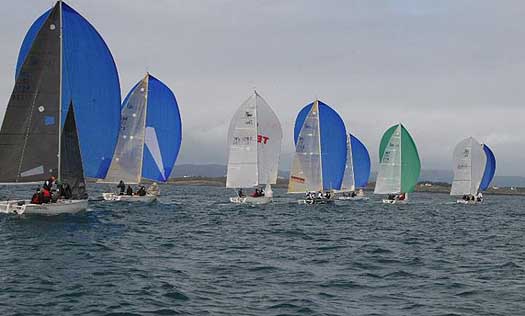
1720s reaching in Baltimore on Saturday. Reader Richard O'Flynn has added more photos to Afloat magazine's facebook page here
Commenting on his win, Mark Mansfield said: 'It was a tremendous event with a very strong tough field sailed in ideal conditions and well organised by Baltimore Sailing Club. No quarter was given nor expected and I think everyone had great sailing over the three days. I have to pay special tribute to my part owner Terry English and the crew, Mike Budd, Joe Bruen and Bernard Fitzpatrick. It was a fantastic showpiece for the 1720 class which is building in numbers significantly.'
Mansfield Holds 1720 Lead
Mark Mansfield holds the lead after six races at the 1720 Corona Euro Championships in Baltimore, West Cork. Nicholas O'Leary onboard T-Bone owned by Crosshaven duo Tom Durcan and Clive O'Shea is now in second place having discarded an ocs from yesterday and father Anthony is in third on the same number of points.
Testing conditions off Sherkin today with strong tides and 12-14 knot winds. Three further races in the series were completed despite a bit of a delay for resetting the course between Races 5 and 6.
Race Officer David O'Brien commented
'Races were longer than yesterday and that made racing more testing for the competitors. There were no black flags today although there was a general recall. Racing is on schedule to complete the championship tomorrow.'
Mansfield Leads 1720 Euros in Baltimore
Current 1720 National Champion Mark Mansfield leads the 1720 Corona Euro Championships in Baltimore after a long opening day of close sailing in steady 10-14 knot conditions.
The 28 strong fleet completed three races off Sherkin Island and Mark Mansfield started the day well with the first bullet.
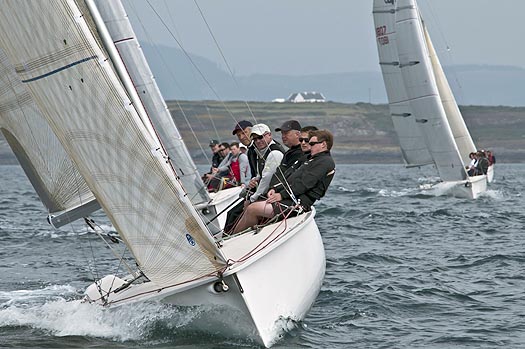
Mark Mansfiled leads the 1720 Sportsboat Euros. Photo: Aidan Coffey
It was a reasonably good day for the O'Leary father and son who are competing against one another. Son Nicholas is onboard T-Bone owned by Crosshaven duo Tom Durcan and Clive O'Shea, having been a close second in the first race he was ocs in the second but went on to win the final race of the day. Anthony meanwhile is lying second over night with a 3, 1, 11 record and local team Peter O'Flynn and John Crotty is second overnight with a consistent 4,4,5.
Race Officer David O'Brien commented on today's racing:
'Conditions were light with strong tides affecting the racing throughout the day. Thankfully wind held fairly steady and we were able to complete the three races with just one general recall'
First gun tomorrow and Saturday is at 1055 with nine races scheduled for the series.



























